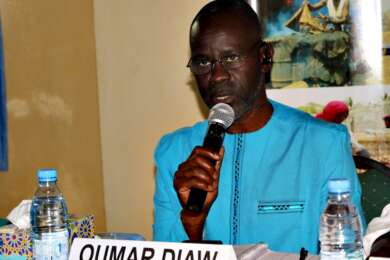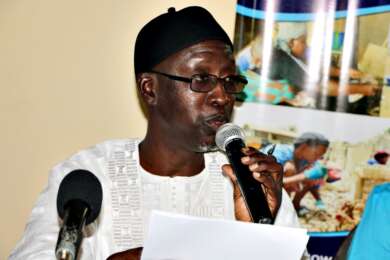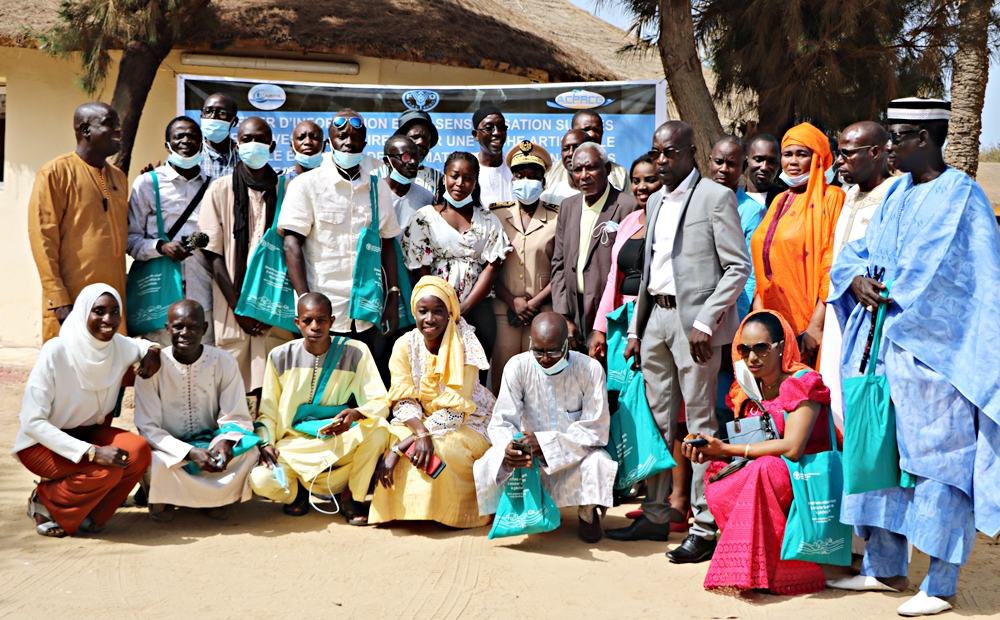Some forty journalists and community radio presenters from Senegal were trained in Saint-Louis on the Voluntary Guidelines for Sustainable Small-scale Fisheries (SSF). This information and awareness-raising workshop for the Association of Fisheries community radios stations presenters and generalists (ACPRCG) of Senegal were held on 2 and 3 June 2021. Organized by the African Confederation of Professional Organizations of Artisanal Fisheries (CAOPA), it aims to provide knowledge and understanding of the Voluntary Guidelines for Sustainable Small-scale Fisheries.
 At the opening of the meeting, the Deputy prefect of Saint-Louis, Ndioro Sarr, indicated that artisanal fishing is the essential link in the Senegalese economy. She said: “The Department of Saint-Louis provides about 60,000 tons of fish for a commercial value estimated at nearly 14 billion CFA francs”.
At the opening of the meeting, the Deputy prefect of Saint-Louis, Ndioro Sarr, indicated that artisanal fishing is the essential link in the Senegalese economy. She said: “The Department of Saint-Louis provides about 60,000 tons of fish for a commercial value estimated at nearly 14 billion CFA francs”.
Aware of the role that communication plays in the context of food security and the fight against poverty, the president of the ACPRCG said: “as communicators, very close to the actors and fishing communities, we believe that we can participate in their awareness-raising so that they are in a position to advocate at the level of political decision-makers in order to encourage them to implement the FAO Voluntary Guidelines, which would be of great benefit to this job-creating sector”.
Omar Diaw reports that fishing alone contributes 3.2% to the national GDP and is the leading export sector with 204.43 billion in export earnings. And it provides more than 70% of the coverage of animal protein needs.
For the host of the fishing radio programme on Radio Dunya Mbour, “this workshop, in addition to equipping us to better understand the challenges of the said Guidelines, should enable us to participate in the promotion of sustainable development of fishing, for the benefit of the actors and communities”.
The president of CAOPA, coming back to the impacts of Covid-19 in the artisanal fisheries sector, underlines: “the measures taken to combat it are proving increasingly difficult for men and women working in African artisanal fisheries.
However, Gaoussou Gueye says, “There is one thing that this crisis has shown. Despite all these difficulties, men and women of African artisanal fishing continue to feed the population. Without artisanal fishing, the health crisis would have been coupled with a food crisis, especially for the poorest populations.
 Referring to the implementation of the Voluntary Guidelines, President Gueye said that the role of journalists and communicators is essential. Hence the holding of this meeting in order to “enable you, communicators, to better know and understand these guidelines, in order to disseminate them to the communities, and to enable the coastal communities to better understand the issues and challenges of their implementation”.
Referring to the implementation of the Voluntary Guidelines, President Gueye said that the role of journalists and communicators is essential. Hence the holding of this meeting in order to “enable you, communicators, to better know and understand these guidelines, in order to disseminate them to the communities, and to enable the coastal communities to better understand the issues and challenges of their implementation”.
To this end, he drew the attention of the beneficiaries to their responsibility to disseminate the content of the Voluntary Guidelines with all the communities so that there is a better understanding of the content of this international instrument.
According to Gaoussou Gueye, CAOPA is happy to work with ACPRCG. Because, «community radio stations work with communities.” And you allow them to express their concerns about fishing.
In conclusion, he invited the participants to be aware of the “extremely important” role they have to play in the fisheries development and the challenges to be faced in the artisanal fisheries sector, especially as the International Year of Artisanal Fisheries and Aquaculture approaches.
Mamadou Aliou Diallo


